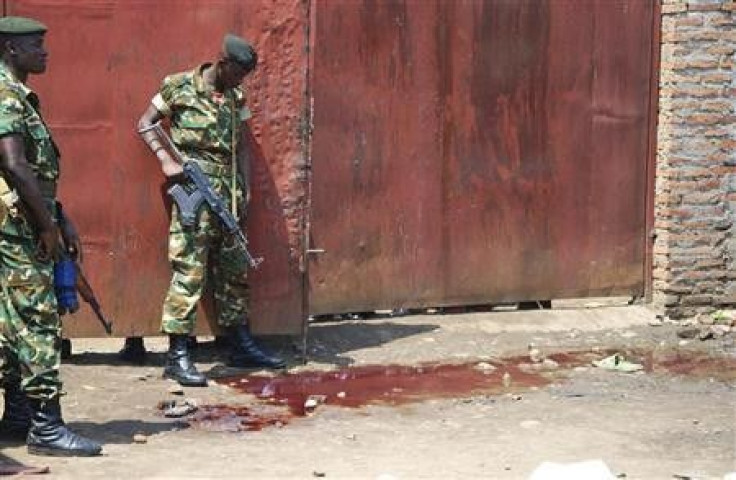Gunmen kill at least 36 in Burundi bar attack

Gunmen have stormed a bar in Burundi killing at least 36 people, the deadliest attack in the Central African country this year that has heightened fears of a return to civil war.
Witnesses said the gunmen, some disguised as policemen, burst into the bar late on Sunday, forced its patrons to the ground and raked the interior with bullets.
Burundi has enjoyed relative peace since the former Hutu hardline rebel Forces for National Liberation (FNL) laid down their weapons and joined the government in 2009 after two decades of insurgency.
But attacks against civilians and soldiers have intensified since elections last year were widely boycotted by the opposition. Tit-for-tat fighting between the security forces and former militia fighters risks blowing up into a full-scale rebellion, analysts said.
The attackers were carrying guns and knives, some of them were dressed in police uniform, said one survivor who was too scared to give his name.
They ordered everyone to lay down on the soil and started shooting the victims one by one, the witness said.
No group has claimed responsibility for the attack, which took place in the town of Gatumba, 16 km west of the capital, Bujumbura, and close to the border with the Democratic Republic of Congo.
FIGHTING APPROACHING CAPITAL
Last year's elections were a political failure and since then the violence has just been increasing, said Thierry Vircoulon, Central Africa project director at International Crisis Group (ICG).
Talk of a new rebellion is not exaggerated. We have a real escalation in the fighting and it's getting closer to Bujumbura.
Former FNL rebel leader Agathon Rwasa went into hiding in DR Congo in June last year after boycotting the presidential poll he said would be rigged.
Local residents said the bar was a popular drinking haunt of supporters of the ruling party.
One witness said several attackers formed a perimetre around the bar to fend off any response by the security forces while others opened fire indiscriminately inside.
Police and soldiers laid the bodies of 23 victims, covered by blankets in rows outside the bar. Inside, pools of blood stained the dirt floor and shards of glass littered the area.
Thirteen others died from the wounds in hospital, a local official said. President Pierre Nkurunziza, who has blamed previous attacks on bandits, declared three days of mourning.
The persons who were brutally assassinated were our brothers and sisters, he told a crowd at the scene of the attack on Monday. I promise that those criminals will be arrested and brought to justice.
Burundi has a turbulent post-independence history. Bitter divisions between the Tutsi and Hutu ethnic groups fanned years of civil conflict.
The FNL Hutu guerrilla group signed a truce in 2005 and gave up its arms. A growing number, however, are returning to the bush to resume the fight amid fears the government is waging a campaign to wipe out FNL loyalists, analysts said.
Early this month, a Burundian rights watchdog (APRODH) said it had documented 125 extra-judicial killings between May and August that mostly targeted former Hutu rebels.
Burundi cannot afford to have the leaders of the opposition out of the country and the opposition totally marginalised, said Vircoulon.
© Copyright Thomson Reuters 2024. All rights reserved.











